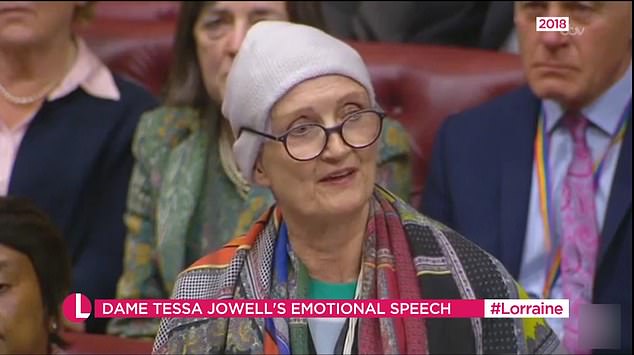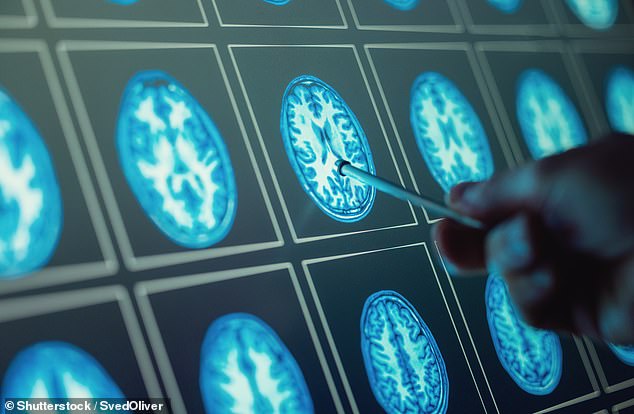It’s already linked to a variety of health benefits, from lowering cholesterol to reducing the risk of Alzheimer’s.
But now the medicinal benefits of olive oil have been found to help patients with the most common form of deadly brain cancer.
A trial of a drug derived from oleic acid, which is found naturally in olive oil, has been found to halt the progression of glioblastoma.
The Royal Marsden NHS Foundation Trust and the Institute of Cancer Research enrolled 54 patients with recurrent glioblastoma and other advanced solid tumors.
Wanted star Tom Parker died in March 2022 after a year-and-a-half long battle with stage four glioblastoma brain cancer, aged just 33 (pictured in December 2021).

Former Labor politician Dame Tessa Jowell died after a battle with advanced glioblastoma brain cancer in 2018 (pictured in the House of Lords in 2018)
Of the 21 glioblastoma patients who received the treatment, a quarter (24 percent) responded well to the drug and one patient experienced “an exceptional response,” lasting more than three years.
The abnormal membranes of cancer cells make it easier for proteins within each cell to meet neighboring proteins and create signals that drive the growth of the disease.
The drug, known as 2-OHOA, which is administered in a sachet with water and taken three times a day, blocks these signals by causing the membranes of cancer cells to act like normal cells.
As a result, it “puts the brakes on” abnormal growth signals, which drive cancer progression, according to findings published in the British Journal of Cancer.

A trial of a drug derived from oleic acid, which is found naturally in olive oil, has been found to halt the progression of glioblastoma.
Dr Juanita Lopez, consultant medical oncologist at The Royal Marsden, said: “Glioblastoma is an incredibly difficult disease to treat and patients with advanced disease have very poor outcomes, often living only a year after their diagnosis.”
«There has been no new effective treatment for this group of patients for almost two decades, so it is urgent to accelerate drug development.
“Unfortunately, brain cancer patients often do not have the opportunity to participate in early phase trials.
“This underlines the vital importance of research into new drugs such as 2-OHOA, which is designed from the same building blocks as olive oil.”
He added: “We look forward to the results of ongoing trials and hope that this treatment will eventually become widely available.”
Glioblastoma is an aggressive type of brain cancer that affects 3,200 people across the UK each year.
They are the most common type of cancerous brain tumor in adults, with an extremely poor prognosis.
Wanted star Tom Parker died in March 2022 after a year-and-a-half long battle with stage four glioblastoma brain cancer, aged just 33.
More trials are now underway at the hospital in the hope that it will one day become a widespread treatment.
Patient Michele Treen said her “whole world collapsed” when she was diagnosed with incurable glioblastoma in March last year.

The study led by The Royal Marsden NHS Foundation Trust and the Institute of Cancer Research enrolled 54 patients with recurrent glioblastoma and other advanced solid tumors.
The 42-year-old, from Crawley, West Sussex, brought forward her wedding and married Aaron a week before undergoing brain surgery.
She said: “We were so happy and so sad that day, crying the whole time.”
‘After the wedding, the first thing we did as a couple was attend another appointment where they told us that the tumor was grade four and incurable. Our whole world fell apart.
She was referred to The Royal Marsden where, as well as being treated with radiotherapy and chemotherapy, she took part in trials of the drug and recently had her fourth consecutive stable scan.
‘I recovered well from the surgery and when they told me about the trial I thought, why not? There’s nothing to lose,” she added.
‘The medicine comes in a sachet, a bit like Lemsip, and I take it with water three times a day.
‘I feel some side effects, such as fatigue and nausea, but we don’t know if they are due to the medication (which could be a placebo) or the chemotherapy I am undergoing.
‘Either way, I feel good and can still do the things I love. For example, I spent the summer traveling through Europe with my husband and 11-year-old daughter in a motorhome. From mountain biking in Andorra to exploring the canals of Venice, I did things I’ll never forget with the people I love most.’

